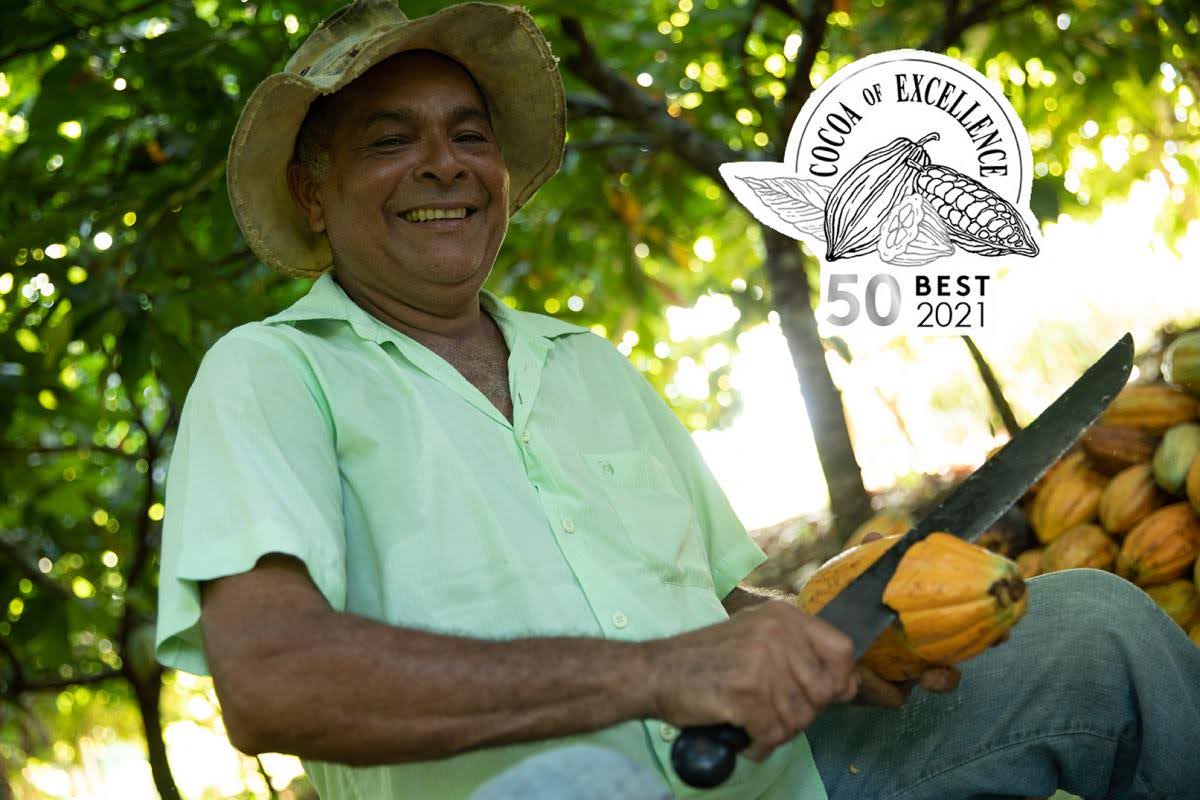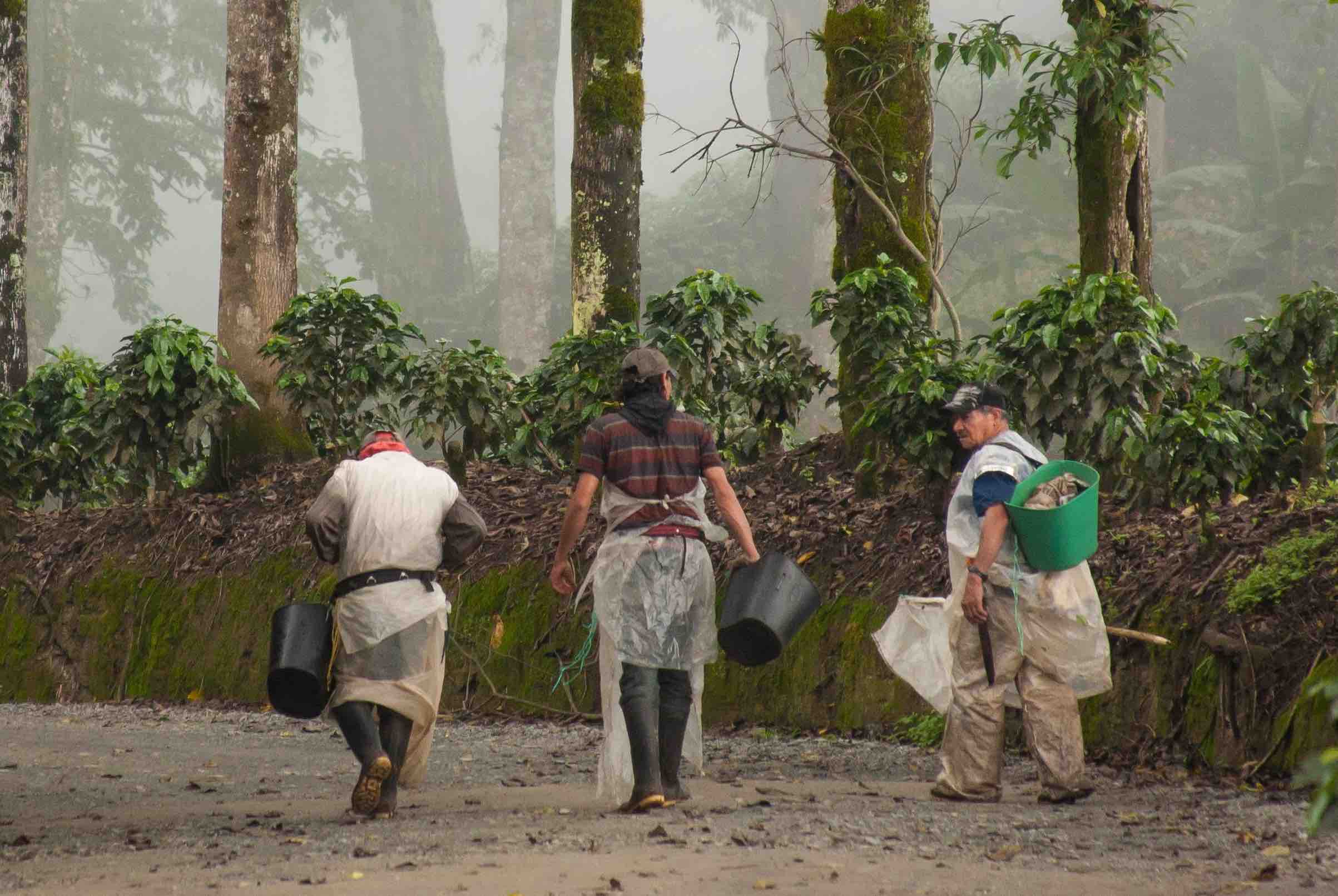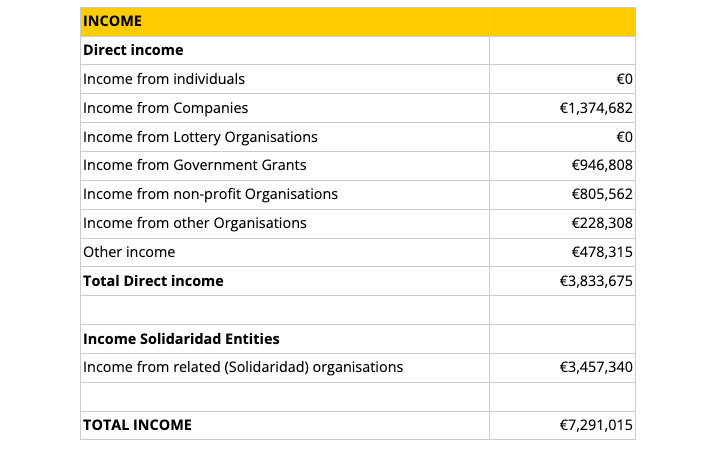Highlights

Palm oil
Solidaridad’s digital application, Extension Solution, was adopted by Fedepalma, a sector organization, to assess their Sustainability Index among 3,000 palm producers across Colombia. In Peru, we concluded the first stage of our partnership with Alicorp, the country’s largest retailer, to provide training to 401 of their producers and 136 of their workers on the implementation of RSPO standards.

Cocoa
We launched the Transamazonica Platform, a multi-sector group that works on environmental regulation, financial mechanisms and forest restoration in Brazil. Its first product was the Public Credit Guide for Cocoa to promote access to information and identify better opportunities for producers who need credit for their production systems.

Sugar
We launched three initiatives with Orplana, a partner producer organization, to strengthen its service provision: a mentorship programme to learn, test and adopt new technologies, a programme for producer associations to develop, finance and implement their own projects linked to innovation, and a training programme for young people inheriting family farms.

Fruit & vegetables
In Peru, we launched ECOBAN, a recycling plant that integrates an importer, a banana union and four smallholder producers’ organizations. It has the capacity to transform 25 percent of the plastic waste generated in the national organic banana production, into more than 270,000 plastic corner pieces used in pallets for exports.

Tea
We assessed producers’ compliance against the sustainability indicators of SAGP in partnership with 66 producers supplying 820 tons of raw yerba mate to Leão Alimentos e Bebidas, a Coca-Cola Company in Brazil, and with the use of Extension Solution, a digital data tool for educators in agricultural good practices.

Livestock
Our dairy model in Chaco reduced green house gas emissions by 63 percent per litre of milk produced after one year of implementation, and has the potential to mitigate up to 97 percent of emissions in ten years. In Mato Grosso, our partnership with ICV contributed to reducing the pressure of deforestation through intensification in 54,376 productive hectares, and conserved 54,273 hectares of forest inside farms.

Soy
Solidaridad launched a revealing study that assessed that four million hectares of degraded pastures in the Matopiba region in Brazil could be transformed into agricultural land and diminish pressure on the remaining vegetation. Likewise, we carried out a feasibility study on converting degraded pastures in the Paraguayan Chaco area to soy, as an alternative to clearing new areas for livestock.

Gold
As part of our project ReValoro, we signed an agreement with the Ministry of Energy and Mines in Peru to formally support the development of the New National Sector Policy for the Small-Scale Mining and Artisanal Mining, and strengthen the process of formalization.

Coffee
2,000 coffee farmers in Colombia and Peru were registered in Rabobank’s Acorn platform to receive carbon sales for planting forests within their farms. This ground-breaking work will enable smallholder producers to directly benefit from the carbon market. The scheme can be scaled further to thousands of producers to diversify their income.
Results

27.7 Million
tonne reduction of carbon dioxide emissions (tCO2e)

889,000
Hectares under sustainable management

21,000
Farmers with farm income increase

Advancing sustainability
A multi-faceted approach
We continued our engagement across and along supply chains to achieve our goals of reduced deforestation and uptake of climate-smart practices, while prioritizing the livelihoods and advancement of smallholder producers.
In 2021, our ambition to advance in sustainable production achieved 888,727 hectares under sustainable management held by 58,175 farmers who implement good practices. Climate-smart production is our flagship programme within the area of sustainable transformation. Last year, we successfully finished an initiative that aimed at scaling climate-smart production with coffee farmers in Colombia and Peru. After engaging 19,734 farmers, we can proudly confirm that 14,822 are adopting good practices, holding 52,446 hectares under climate-smart management. This represented an increase of 53 percent compared to the baseline.
Regarding the economic viability of coffee producers, farmers in the project increased yield by 10 percent and income by 70 percent. On the environmental side, producers are capturing three times more carbon compared to baseline, while reducing their emissions by 0.44 Kgs of CO2 per hectare. During the journey, we also refined our carbon measurements and thanks to our previous studies, we managed to on-board key allies who are willing to pay for the environmental services smallholders offer (see story of Doña Rosa). Thanks to our progress in understanding deforestation, we developed algorithms that allow us to analyze at scale land-use changes in small areas. As a result, the pressure of deforestation was reduced in 5,213 hectares of Amazon forest. The results of this initiative confirm that the tested production models not only are profitable, but also improve the resilience of producers to climate change.
Strengthening Technical Assistance
Our strategy to enhance the effectiveness of technical assistance is well reflected in the Muda Cana programme. Our key partner on this initiative is the sector association Orplana, a sector organization that brings together 32 producer groups. Together, we identified that providing cost-effective technical assistance is fundamental to improving the economic, social and environmental performance of farms. This is a service that is not provided by any other actor in the region and could be best offered by producer organizations.
In the last three years, Muda Cana has improved the process to incubate cost-effective technical assistance models in associations. The process includes developing a system to evaluate producer groups against benchmark criteria for service provision and support them to adopt the improvements. The aim is to increase reach and quality of technical assistance so the producers can improve their performance. The cost variable considers that the improvement of services is developed organically within the association, and being covered by their financial structure (usually based on a fee on sugarcane volume produced). Through Muda Cana, we have supported 22 farmers’ groups that have provided improved services of technical assistance to 6,900 farmers during the project (45 percent of sugarcane producers in Brazil, the largest producer of sugar in the world). In 2021, we reached 4,176. From these associations, six went further to implement a continuous improvement model to advance on sustainability. After six months, 30 percent of the producers improved the adoption of practices, reinforcing the effectiveness of the model.
Access to finance
2021 was a year to scale existing partnerships and develop new ones. The most significant source of finance in the region has been the Acorn scheme from Rabobank, where we registered 2,000 producers. These producers will be evaluated in 2022 to receive the first payment for their environmental services. The results of this partnership represent 63 percent of our target of producers set to access finance for 2025.
In addition to this, we have developed other innovative schemes such as the app AgroPrestamo that facilitates the risk assessment of producers to access credit. So far, 517 producers have been registered and 339 have received credit. Two additional ground-breaking partnerships started in 2021 with Planet Gold and the Mining company CI ESLOP, who are working together with miners to understand their financial needs and improve their financial management skills to receive credits in 2022. The former is particularly important, as artisanal gold mining is usually excluded from formal credit.
Solidaridad, in partnership with the Tropical Forest Alliance, facilitated the signature of two sector agreements in Colombia and Peru that aim to reduce deforestation associated with the production of coffee and cocoa, whilst promoting sustainability at national level. These agreements not only captured the existing commitments of the public and private sectors to reduce carbon emissions, but also identified specific priorities to move from agreements to action in the next three years. The latter is particularly relevant in the light of the European Commission’s proposal published in November for a regulation to minimize the risk of deforestation and forest degradation with products placed in the EU market. Europe is the main export market of Peruvian cocoa and the second export market of Colombian coffee, after the United States.
Our strategy to scale the adoption of sustainability practices is to engage companies to source and recognize sustainable production. In 2021, we worked with 36 companies identifying, piloting and scaling different solutions in this regard. Among all, our strategy with JBS, one of the biggest meatpacking companies in the world, has shown how progress can be exponentially achieved.
Our team in Brazil has been working with JBS for several years. The initial approach to the company happened in the frame of our programme of sustainable and resilient territories in the Amazon that promoted integrated systems of cocoa and livestock in the municipality of Novo Repartimento, Pará. This project grew to support 230 families who showed a clear increase in productivity and income (See João’s story). In parallel, they became a critical ally to promote the implementation of sustainable production guidelines (GIPS) within their suppliers. Through the years, we have investigated the trade-offs between livestock production and carbon emissions, as well as the environmental impact of small livestock producers.
In 2019 we published the study Small scale, great opportunity: towards sustainable young livestock farming in the Amazon and the potential of the Innovation and Learning Hubs (ILHs) with Wageningen University. In 2021, we reached an important milestone; the JBS fund will support 1,500 producers in Pacajá, Anapu and Novo Repartimento in the transformation of their production systems integrating sustainable livestock with other crops, such as cocoa, to complement income and reduce deforestation in their supply chain. This is the largest private sector partnership in Solidaridad’s history.
Most Significant Changes

João Evangelista and the best cocoa in the world
Hailing from a small community in Brazil, João Evangelista entered the 2021 edition of the Cocoa of Excellence competition and ranked among the world’s best 50 bean samples. His cocoa, grown in agroforestry systems in addition to its optimal quality, contributes in restoring the Amazon.

REWARDING FARMERS FOR WARDING OUR FORESTS
Doña Rosa has long known what climate change means for her farm, and she’s intent on doing her part to combat it. Joining Solidaridad’s ‘Coffee of the Future’ programme has given Doña Rosa crucial skills and tools for making sure her coffee remains good for her business and the environment.
Organization & Governance
Reaching new heights
Growing our team and our borders
In 2021, we expanded our reach to Suriname, and also grew our team in important ways to meet the demands of new programmes and partnerships. To support these staff, we are continuing our emphasis on learning, evaluation and attention to human resources and integrity systems.

In 2021, we implemented a total of 7.2 M EUR mainly from two new funding sources: GIZ (655K EUR) and JBS (260K EUR). In order to implement these funds we hired 39 new staff, in addition to our current staff, to deliver our work in the region. This includes 13 staff members in Brazil (eight from programmes, three from ICT and two from support services), 13 in Colombia (11 from programmes, one PMEL officer and one communication officer), eight in Peru (four from programmes, two finance, one communication trainee, and one HR), and one in Argentina from one programme. We also managed to maintain contracts of seven programme employees in the Paraguayan Chaco, despite the fact that they were only budgeted until 2020.
Solidaridad expanded its reach in South America in 2021 with a new partnership with Newmont in Suriname. The aim of the initiative is to work with communities in the areas of influence of the company in order to support their development and diversify their activities beyond mining. This is an ambitious three-year initiative.
Solidaridad has achieved a milestone in 2021 by closing a long-term partnership with the JBS Fund for the Amazon to launch the RestaurAmazônia programme. The programme will implement 7.5 million EUR to scale the agroforestry model we developed in the Brazilian Amazon from 230 to 1,500 families, across three new municipalities in Pará.
The work alongside Cargill has also expanded across several commodities and landscapes in the region. In soy, we are amplifying the number of farmers supported under the Triple S programme in Paraguay, while making progress in the implementation of the Sustainable Soy Path (SSP) programme in Santa Cruz, Bolivia, to certify soy producers under sustainable production practices. We also carried out two projects from the Land Innovation Fund, funded by Cargill and managed by Chemonics. The first project in Argentina, Bolivia and Paraguay aimed at coordinating actions between three multi-stakeholder platforms to set a common agenda for sustainable soy in the Chaco region. The second project, developed a methodology to estimate the carbon balance of soy under current management systems in Western Bahia. In palm, we are boosting the adoption of RSPO best practices among smallholders in Bolivar, Colombia, and in cocoa, we are supporting Cargill’s suppliers in Ecuador. Finally, under Cargill’s Restore and Protect Programme strategy, we will restore 1,000 hectares with yerba mate in Brazil under agroforestry systems.
Collaboration with Cutrale, the Coca-Cola Foundation, the Coca-Cola Company, Innocent Drinks and Eckes Granini to improve sustainability among small orange producers in Brazil enhanced the involvement of other initiatives. We created synergies with the sector portal Citros Conecta to provide producers with access to all kinds of information provided by the industry and training centers. We also partnered with the Centro de Citricultura Sylvio Moreira (CCSM), which promotes training and field days for project participants, allowing time for exchanges with researchers. Other private companies we worked with in 2021 are ADM, Alicorp, Barry Callebaut, Coca-Cola, Henkel, Martin Bauer, Nespresso, Nestle, Olam, Raízen and Syngenta.
Data model implementation
In 2021, the Network developed guidelines to align the way of measuring indicators represented in a data model. Last year, Solidaridad South America conducted a series of training sessions with all PMEL staff in which the data model was reviewed in detail with PMEL coordinators in each country. ThIn 2021, the Network developed guidelines to align the way of measuring indicators, represented in a data model. PMEL staff from South America conducted a series of training sessions to review the data model and ensure it is well adapted to our regional context. The model was also reviewed extensively by the South American Digital Unit, based on their experience in collecting high-quality data. A test version of the data model survey was developed to run under the Extension Solution app in new projects. Furthermore, we are assessing with a data indexation expert how and which of the datasets we used in the past can be used to feed in the new indicators as agreed in the Multi Annual Strategic Plan for 2021-2025. This assessment will be finalized in 2022.
Project evaluations
Norad
During 20201, external evaluators assessed the Norad funded project ‘Commodity supply chains and green growth’ that runs in three producer countries (Brazil, Colombia and Peru) and three markets (China, USA and Europe). Their main findings were:
- The project addresses quite a broad variety of commodities, involving rural producers as well as market players and even investors, and their respective organizations. The project has identified effective means to produce without deforestation and, in many cases, enhancing vegetation cover in the Amazon forest and the Cerrado. Producers have seen productivity and income increase in a sustainable manner, and all initiatives have demonstrated clear potential for scaling up.
- Solidaridad contracted project staff with not only strong technical skills, but also considerable credibility with rural producers, which had a very positive impact on effectiveness.
- The project paid attention to carbon balance. Whereas in Colombia and Peru the results obtained have been quite modest so far, the results obtained in Brazil are significant.
- The work with investors and traders is showing progress, particularly in the United States. In China the process was slower, but considering the importance of the Chinese market, it should remain a priority.
- All initiatives have proven their worth and their potential for scaling up. With the NORAD funding coming to an end Solidaridad has been able to secure new funding, or is in an advanced stage of negotiations, to continue this ambition.
Practice for Change (PfC)
An external evaluation as part of our partnership with the Dutch Ministry of Foreign Affairs was conducted during 2021. For South America, the project selected was “Developing a collaborative and cost-effective technical assistance model”.
- The evaluation showed that the project offers good examples for scaling and collaborations among the sectors. Trust between players has been key to achieve progress.
- The model proposed addressed the key problem: Inequality on access to technical assistance to different types of producers. Smallholders, in particular, have limited access to this service, which has been addressed by the incubation of new service providers or by strengthening providers that already reach them. A key element in developing this model has been to focus on a viable model, rather than on a tool that supports the process.
- Another crucial variable for success was the constant evaluation of assumptions, which allowed for correct direction whenever needed.
- Gender awareness increased as a result of the project. In the future, it is recommended that the findings should be complemented by a clear strategy and an implementation plan.
In 2021, João, one of the producers from our cocoa programme in the Amazon was selected among the 50 best cocoa beans in the world, and received a silver award. Also, our programme in the Amazon won the Netherlands-Brazil Sustainable Agriculture Challenge. In Colombia, the Ministry of Agriculture and the Interamerican Institute of Cooperation in Agriculture (IICA) selected AgroLearning as one of the outstanding experiences in innovative technical assistance across Latin America, and Global Compact awarded RGC for its contribution with Solidaridad to the SDO5 in “Las Rosas” project.
In Q4 we launched a new website for Spanish-speaking audiences, which tripled our impressions in search engines, and improved organic acquisition by 79 percent. We also had a 20 percent increase in views and 23 percent increase in sessions versus 2020. Referrals due to joint work with partners also increased by 215 percent. In social media, Latam channels reached almost 3.3 million impressions with a 3.1 engagement rate, and 2,396 new followers, while Colombia and Brazil channels amounted to 4,386 new followers.
Our joint project with JBS, “RestaurAmazônia”, was presented at Expo Dubai, and featured in Globo Rural, CNN Brazil and Forbes Brazil, among others. Our coffee programme was on national (Caracol TV) and international TV (Deutsche Welle and Weltspiegel), as well as in the main national newspapers in Colombia and Peru (El Tiempo, El Comercio).
We also launched relevant studies that provide scientific data to decision makers on the economic viability of low carbon agriculture in the Amazon, GHG emissions balance in dairy in Chaco, the profile of Brazilian livestock, efficient land use in the expansion of soy in Matopiba, sustainable palm oil production in Colombia, and the coexistence between conventional and small-scale and artisanal mining.
Our offices organized 22 sector events, and our experts participated in 24 events, including the World BioEconomy Forum, NY Climate Week with the Tropical Forest Alliance, the UN Food Systems Summit, the “Climate Spark” from York University and a Forum organized by the Colombian Ministry of Agriculture on successful gender inclusion experiences.
There were no integrity cases reported in 2021. Two persons of Trust were appointed in Brazil and Peru, as well as an Integrity Advisor for South America. The regional Integrity policies were updated in alignment with the network and translated into Spanish and Portuguese. Also, the regional Human Resources policies integrated compliance aspects of the renewed Integrity system.
Finance

Important contracts for the region were secured in 2021. A contract with GIZ for 2.3 Million Euro planned to be implemented in Colombia until 2023 and another with JBS for 7.5 million Euro planned to be implemented in Brazil until 2025. Thanks to these and other funds Solidaridad South America was able to raise additional income of 1.6 Million Euro for 2021.

The actual expenditure in 2021 was 93% of the budget presented to the International Supervisory Board. However, the composition of the expenditure varied. Covid restrictions during the first semester of the year limited significantly the implementation of activities in the field, which meant that only 71% of the planned budget was implemented. Nevertheless, new income and expenses compensated for the difference.
Only 30% of the activity budget planned in September 2020 was implemented due to mobility restrictions. The activities that could not be carried out are part of projects with an end date beyond 2021, so planning and targets were rescheduled in agreement with the donors.
Employee expenses were higher because new projects were started and 39 additional staff was hired for these projects.
The full audited annual statements of 2021 can be found below:
